- Home
- Cherie Priest
Maplecroft Page 5
Maplecroft Read online
Page 5
Using the axe like a rake, I scraped the corpse to the basin’s edge and then lifted it, exhausting what felt like the last of my strength. I couldn’t just drop the thing into the corrosive bath, not unless I wanted to splash myself with its awful contents, so I lowered the body carefully into the thick, strong-smelling solution.
With a shudder, I released the crank hook and the lid ratcheted quickly shut. I fastened a set of locking bands into position, and then I worked a round dial just beneath the pressure gauge. I turned up the heat as far as it would go, and set the timer to keep it at full temperature for the next three hours—which would certainly be time enough to dissolve the creature down to viscous syrup.
Then, in the morning, I’d make sure. And once I was satisfied that there was nothing left, I would pull a lever and let the oily residue drain down a refuse pipe which emptied out under the lot behind our house.
As I said, this was not a cheap thing to have designed, produced, and installed in our cellar, though I don’t regret a single penny of the expense. I got the idea from one of Emma’s biology periodicals, wherein various authorities were discussing the best way to dispose of dead farm animals; and every day I half expect to see some sensational news story with my name on it because my bribery of the workers who brought the machine was not enough to keep them from talking.
Any day now, the authorities will knock and the headlines will declare I’ve been murdering again, and this time destroying the evidence.
• • •
I stood up straight and leaned back. I gazed tiredly at the cabinet door and kicked it shut. It fell with a thunderous clank that Emma heard, all the way upstairs on the first floor, where I’d left her.
“Lizzie?” she cried out.
“Everything’s all right. It’s done now,” I said with a sigh. Then I remembered and called, “Emma dear, I’m nearly finished.”
“Thank God,” she murmured. I barely heard it.
“I’m cleaning up, that’s all.”
My axe was on the floor beside the trapdoor. It was covered in the creature’s bile, or mucus, or blood, or whatever fuels it—pumping through those sinewy lines and oily muscles. The slime was foaming very slightly, blossoming into a revolting brown fluff. I picked up the axe and held my breath as I brought it close to my face, so I could see it better.
Yes, just like before. Where the putrescent fluids met the iron, the weapon sizzled like it was doused with acid. But not an acid eating away at the metal—more the opposite, I should say. It is as if the metal eats away at the blood.
Iron hurts them somehow, doing more damage than if I hit them with a bat or a mallet. Wood won’t do it. Stone won’t do it—as I learned on one occasion, having been cornered by the porch stairs and finding only a loose chunk of paving rock to defend myself. It pushes them away, of course. Any sufficient blow will rebuff them, but only iron will stop them.
I took a damp rag from a bucket full of water and soap, making a murky soup. I scrubbed the axe-head down. If it’d been made of shinier stuff, it would’ve gleamed when I was finished.
I moved along to the splatters on the floor, and to the murk on the stairs. On my hands and knees, I washed the steps one at a time. And when I was finished, I retrieved the now-clean axe and brought it with me as I made my exit, pausing briefly at one of the book stacks and selecting a volume.
The axe-head. The iron.
I was reminded of something, and I wanted to double-check my memory on the matter.
The steps groaned beneath my feet, and I groaned with them. My ribs ached from the exercise, from breathing so hard against the corset stays.
At the top, I unlocked the door and let myself out.
Emma was still seated by the landing. The guns rested on her lap, leaving heavy dents in the folds of her skirt. Her hands lay atop the guns. She looked frail, and old.
She sighed with relief at the sight of me.
I tried to smile. “I told you I’d be right up.”
“Yes, and I’m glad. I was worried—I couldn’t remember if you’d taken your keys.”
“I always have my keys. Here, let’s get you to your feet,” I offered, setting aside both the axe and the book in order to slide my arm beneath and behind her.
“I don’t need so much help,” she chided me.
Sometimes, she did not. Tonight, she did. “Stop fussing, and let me get you upstairs. It’s late. We’re both tired. I’ll get you ready for bed.”
Together we walked with excruciating slowness. If I’d urged her any faster I would’ve had to carry her, and that would’ve been embarrassing and painful for us both. Instead we moved at the steady pace that made my aching arms ache all the more, and the bruising at my ribs protested with every step, all the way to my sister’s room.
I drew out the stool at her vanity and lowered her onto it, and I stretched, cringing at the crackle of joints popping, and the dull warmth of strained muscles.
Emma stared quietly at herself in the mirror, and at me. She said, “We’re quite the pair, you and I. The invalid and the murderess.”
I turned away from the mirror and went to the switch on the wall. I pressed it, and the room came alight with the glow of the wall lamp. Its pretty shade was made of frosted glass, so the light was diffused and softened. It was kind to us, or so I saw when I returned to the vanity seat and began to undo Emma’s hair.
One by one, I pulled the hairpins gently free and laid them on the table. “The scholar and the warrior?” I tried. “Let’s say that instead. I like the sound of it better.”
She laughed. I think it was genuine. It’s hard to tell, with eyes like hers—too wise to find many things funny. “Another set of lies, sister. Nicer ones.”
“But you are a scholar. And tonight I’ve slain a dragon. Of sorts.”
“True and misleading. I’m not Professor Jackson, and you’re no Saint George, nor an Amazon, either.”
“Says you.”
I tugged at the final hairpin, the veritable lynchpin of her coiffure’s architecture. It slipped free, and her hair came down in a jagged cascade, unfurling and unfolding in a marbled mixture of brown and silver down her back. I took a brush and began to smooth it. I told her, “No one ever needs to know.”
And likely, no one ever would.
Emma Borden, consumptive spinster . . . masquerading as Doctor E. A. Jackson—retired professor of biology and chemistry. The venerable mythical doctor had authored dozens of papers published in journals as far away as France, on everything from seaweed blooms and ocean temperatures to parasitic infections in crustaceans of the northeastern Atlantic.
Who would even believe it, if we announced it? We could put an advertisement in the newspaper, and no one would consider it possible.
She mused, “Someday, someone is bound to learn some secret or another. Yours, or maybe mine. Someone could come here, looking for me.”
“Someone?” I knew her too well. She had someone in mind.
“There’s a fellow upstate, at Miskatonic University.”
“You’ve mentioned him. You think he might come here? Seeking you?” I moved on from her hair to her dress, which I unfastened one rounded glass button at a time, feeding them through the tiny loops that ran from the top of her neck to the small of her back.
“There’s always the chance. I rather like him, and I suspect we’d enjoy one another’s company. Maybe he feels the same way.”
Only a few more buttons to go. I fumbled with one of them, released it, and moved on to the next. I did not ask her anything. I only said, “If he comes, we’ll deal with it then. We can always claim that the good doctor died since last you wrote.”
“I’ll say no such thing. I have two more articles pending for publication.”
Wearily, I told her, “Well, the secret is yours, Emma dear. Do with it what you wish.”
I helped her dress for bed. I fluffed her pillows and gave her the day’s mail—including two of her favorite periodicals. I kissed her on
the forehead and wished her good night. I lit the candles on the bedside table and extinguished the lamps as I left.
In the parlor, my father’s old clock gonged the hour. It was one o’clock, and therefore, morning. I was filthy and my dress was ruined. I traded it for a nightgown with slippers, and resolved to burn it, as I’d burned other dresses before it.
I’d wait for dawn, if I could sleep that long. Or sleep at all.
I remembered that I’d left the axe and my book downstairs. I set out to retrieve them.
Come daylight, yes—I’d destroy the dress, and check to bolt the cellar’s exterior doors, so that no one could come or go without my keys (or perhaps a stick of dynamite). When the sun was up, I’d check the cooker and empty its contents; I’d examine Maplecroft’s exterior, and its lawns, to make sure that no trace of the creature had been left behind.
But first, I staggered up to bed, toting my book and my axe.
I left the axe leaning against my nightstand, a childish gesture which made me feel silly, but more secure than if I’d left it elsewhere. I wanted to keep it within reach.
I lit my candles. I drew up my knees and let the book fall open across them.
The volume was heavy. It left creases on the quilt. Its pages smelled like dust and feathers, leather and wood, mildew and uncertainties.
A People’s History and Guide to the Myths, Lore, and Habits of the Fey, by Alfred Hanstible Valant III. Paris, 1797. (Translation provided by Edmund Lowe, PhD International Metaphysical Studies. MUP—1829.)
It’s a silly title.
And to be clear, these creatures which are infesting Fall River . . . I do not believe they are fairies. They are not ghosts, or elves, or gnomes, or demons. They are not brownies or bogies. But when I read about such mythic monsters, I detect a glimmer of some similar sentiment—an undercurrent of truth, a glimmering seam of gold buried in a worthless boulder. I read about peasants, priests, and alchemists in days of old who had codified their superstitions into wards, hexes, potions, prayers, chants, songs, and systematic protective behaviors in order to keep themselves safe from dastardly influences. They were testing the boundaries of unknown things, attempting by trial and error to manage the stuff which goes “bump” in the night.
They were the scientists of their times, these people. They experimented with dark forces and dark creatures by choice or by desperation, combining and recombining the things they knew with the things they suspected—fishing, always fishing, for a reliable inoculation against evil.
I skimmed a few pages, running my finger down the lines until I found what I’d dimly recalled from earlier readings.
One thing and one thing alone is certain with regards to foul specimens of the dark court fey: They fear and loathe contact with any rusted item, be it tool, or lock, or ornament. They eschew the touch of this substance, recoiling as if burned or otherwise contaminated. In some rural counties, where the friendly assistance of nearby neighbors or peace officers is not readily at hand, nails are left in the rain to rust—then gathered, collected, and pounded into doorways and windowsills as a barrier against entry by any unwanted supernatural creatures. A barrier such as this is considered to be one hundred percent effective, and utterly foolproof.
I found the “foolproof” bit unlikely, but this small, overwrought paragraph gave me much to think about. The author proposed that the critical element is rust. Rust does not occur without the presence of iron. My axe was not at all rusty; I kept its edge ground fine and its surface well cleaned. Yet still, I noticed a reaction. A difference. A significant improvement in efficiency, as compared to other instruments.
“It’s not the rust,” I argued with the book, and its long-dead author—should his disapproving shade be present. “It’s the iron itself.”
I considered the implications, if there were any. My bedside candle flickered and steadied, along with my thoughts. When first I’d read Dr. Valant’s mention of the nails, I’m sure I thought it was frivolous. A fallacy of the poor and uneducated, a superstition without merit.
Now . . . I was not so certain. The two things, iron and rust. One known to be effective, one claimed to be. Did it matter that I did not understand the mechanism by which it worked to prohibit monsters? Not if it worked regardless.
I slapped the book shut and swung my legs out from under the bedspread. When I put my feet on the floor, the cold of the boards shocked some of the sleepiness out of my bones—thank God—because I’d never be able to sleep now, not until I’d tried it.
I did not care what time it was.
I cared only a little that Emma was fast asleep when I reached her room with a hammer in one hand and a box of nails in the other. I turned on the lamp to rouse her, and she blinked, yawning herself awake.
“Lizzie?”
“My apologies, sister dear. I’m afraid this can’t wait.”
“What can’t wait?” she asked, her words clogged and close together. “What time is it?”
“Close to two in the morning, I imagine. But if this should work, and if I fail to do it, I’ll never forgive myself.”
“Oh dear. You’ve found some new . . . some new trick, that you want to try?”
“I don’t think it’s a trick,” I told her. I got down on my hands and knees. I positioned one nail at the far left, against the doorframe. “I don’t know why, but I think it will keep them out, even if I’m not here.”
I drove the nail hard. The bang of the hammer was louder than thunder in our night-quieted home, and I flinched, but I hit the tiny spike again until it went flush with the floor.
Emma propped herself up on the pillows to watch me. She was resigned to this. It was not as if she could stop me should she want to, and she knew she could not talk me out of it. We’d fought about it often in our first year at Maplecroft, and never once had she won.
When I find a thing that works, I will implement it.
If it is inconvenient, if it is ridiculous, if it is insane . . . I do not care and will not let that stop me. I will try everything, and if even some of it works, some of the time, that’s a measure of protection we would have otherwise lacked. I will never let it be said that my sister died, or was turned, or taken, by those insidious fiends. Not on my watch, and not from my home.
First, I would pound a million nails into the house, and do it gladly. First, I would let the whole town think I’m a madwoman and a murderer, let it scorn and reject me, let its children compose hateful rhymes to be sung whilst jumping rope, let the entire Atlantic bubble and boil and storm against our shores—throwing up with the tides a thousand such inhuman, unholy creatures as the one I’d killed that night.
One by one I lined up the nails and beat them into place, and when I was finished with Emma’s doorway I moved on to her windowsill. And when I was finished there, my hands were chapped and beginning to bleed, so I stopped.
I could save my own doorway for morning, like everything else.
BE SURE YOUR SINS WILL FIND YOU OUT
Owen Seabury, M.D.
MARCH 17, 1894
Matthew Granger has been a patient of mine since the moment he was born. I delivered him on a Sunday night, late enough that we may as well call him a Monday’s Child. What’s the lore on that one? Monday’s Child is fair of face, isn’t that the way it goes? Nonsense, of course. Even if he’d been a good-looking boy, one shouldn’t read too much into these things.
Young Mr. Granger was not particularly handsome, though he wasn’t the sort to frighten horses with his homeliness, either. An ordinary lad, you could say. Neither large nor small, thin nor fat, smart nor dull.
His father died when he was very young and when he was ten his mother passed away also. Following this, he was taken in by Ebenezer Hamilton and his wife, Felicity—the godparents, I believe. They keep a shop down at the waterfront, performing all sorts of odds-and-ends duties for the fishermen who work the waters. At Hamilton’s Ocean Goods and Supplies one can pick up stray parts for navigational equipmen
t, find new nets and get old ones mended, acquire bait for more casual fishing, and pay a penny a pound for stray bits of wave- and sand-tumbled glass and shells from a barrel by the front door. These bits end up in decorative ponds and small aquariums, in water closets, and sometimes in jewelry, hair sticks, or other baubles . . . most often marketed to the tourists who visit the shores when the season is right.
Among Matthew’s many minor duties was this one: He was obligated to keep the barrel brimming with attractive sea detritus.
Often he could be spotted down on the rocks, either in bare feet or wearing soft, flat slippers. He moved between the boulders like a cat on a shelf, picking his way deftly, his eyes on the cracks where soaked sand had been washed by the tide, threading itself in thin white seams full of tiny treasures. To watch him, you’d swear he was a creature of the shore himself, moving from stone to sand to surf with such unwavering expertise.
Just a child still, really. Not a man yet, though nearing that cusp where people hesitated to call him “boy” but wouldn’t yet call him “sir.”
When his godmother summoned me, she did so without his knowledge. She asked it as a favor, offering to pay me in the freshest seafood she could barter. Dutifully I appeared in her shop, strung with its nets, its gleaming brass instruments both assembled and disassembled for restoration, and its barrels of salt, stones, shells, floaters, linen scraps for sail patches, and every other thing a coastal shop might carry.
Mrs. Hamilton, stout of frame and white of hair, was frowning worriedly when I arrived.
After greeting me she said, “He’s out there now, like always.” And she wrung her hands together.
“Filling the barrel?” I asked, and glanced toward the door.
There it was, and overflowing. Literally—its contents spilled into drifts and hillocks across the creaking wood floor. Mrs. Hamilton had deployed a bucket to address the surplus, but it too was brimming. Likewise the mugs and the saucers were piled to heaping. It looked for all the world like there must be some leak in the ceiling through which these button-sized sea notions dropped in an unending trickle.

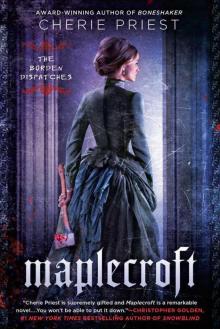 Maplecroft
Maplecroft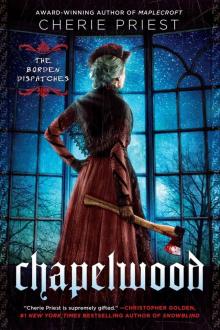 Chapelwood
Chapelwood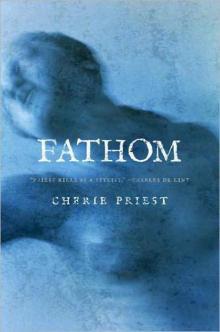 Fathom
Fathom Hellbent
Hellbent Jacaranda
Jacaranda Four and Twenty Blackbirds
Four and Twenty Blackbirds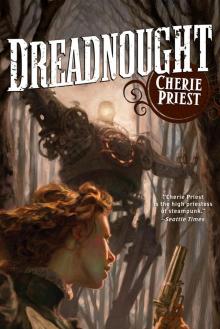 Dreadnought
Dreadnought Dreadful Skin
Dreadful Skin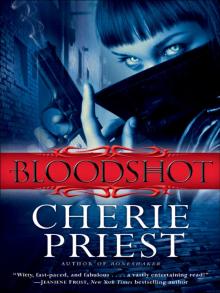 Bloodshot
Bloodshot Tanglefoot
Tanglefoot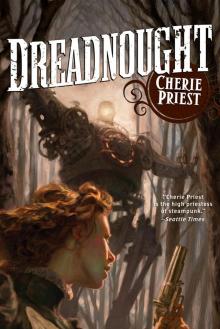 Clementine
Clementine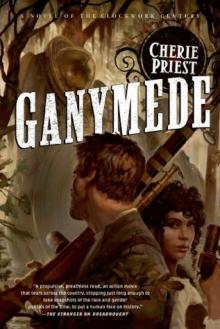 Ganymede
Ganymede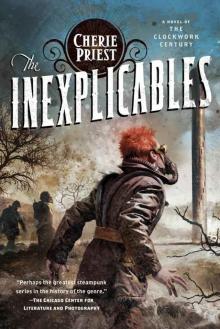 The Inexplicables
The Inexplicables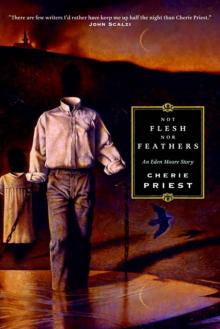 Not Flesh Nor Feathers
Not Flesh Nor Feathers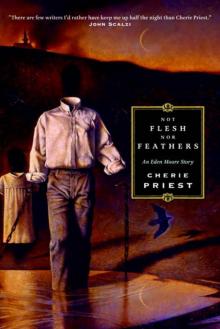 Wings to the Kingdom
Wings to the Kingdom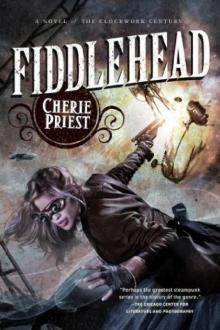 Fiddlehead
Fiddlehead Tanglefoot: A Story of the Clockwork Century
Tanglefoot: A Story of the Clockwork Century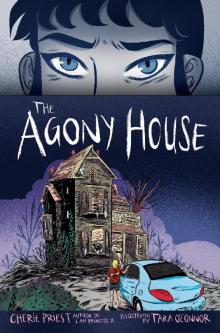 The Agony House
The Agony House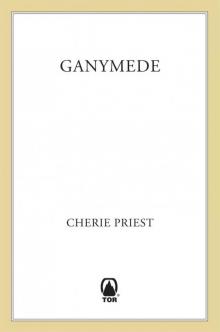 Ganymede (Clockwork Century)
Ganymede (Clockwork Century)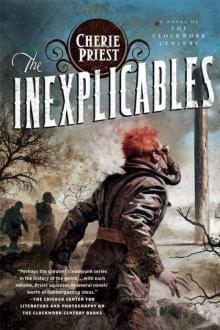 The Inexplicables (Clockwork Century)
The Inexplicables (Clockwork Century)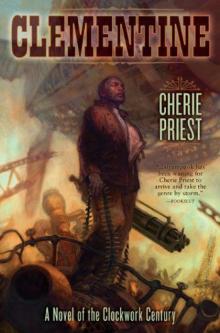 Clementine tcc-2
Clementine tcc-2 Grants Pass
Grants Pass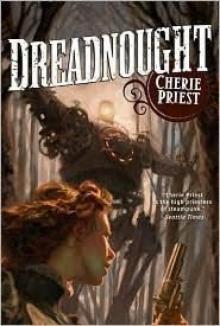 Dreadnought tcc-3
Dreadnought tcc-3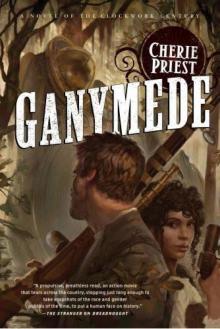 Ganymede tcc-4
Ganymede tcc-4